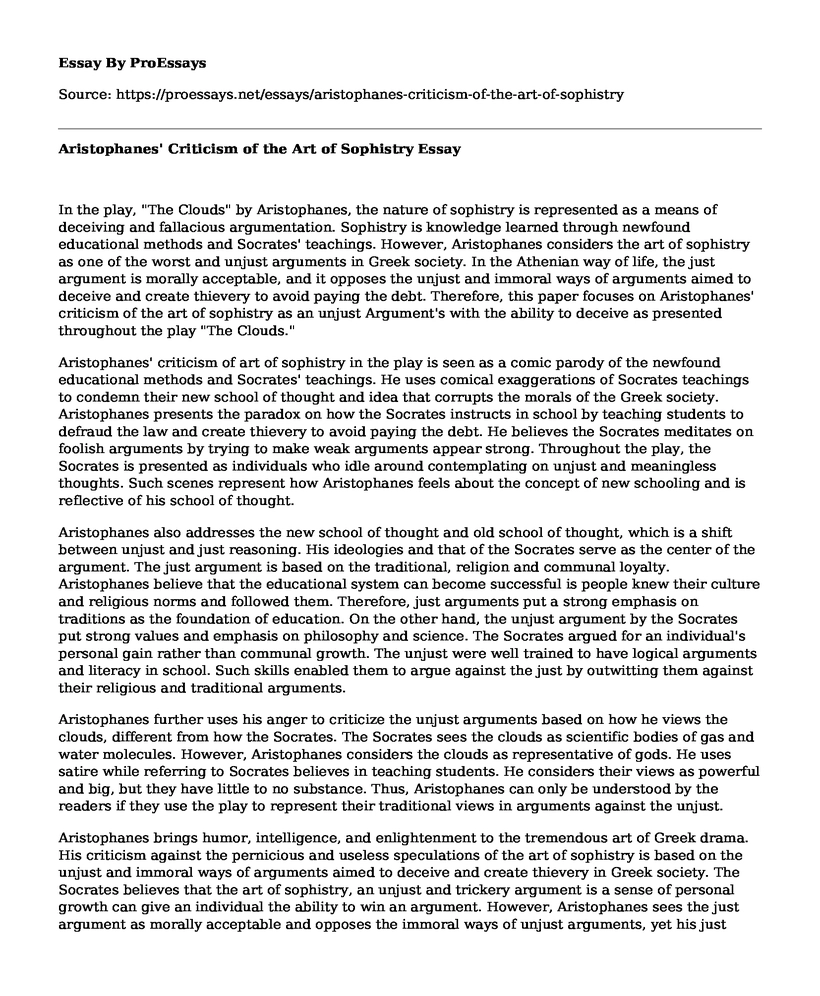In the play, "The Clouds" by Aristophanes, the nature of sophistry is represented as a means of deceiving and fallacious argumentation. Sophistry is knowledge learned through newfound educational methods and Socrates' teachings. However, Aristophanes considers the art of sophistry as one of the worst and unjust arguments in Greek society. In the Athenian way of life, the just argument is morally acceptable, and it opposes the unjust and immoral ways of arguments aimed to deceive and create thievery to avoid paying the debt. Therefore, this paper focuses on Aristophanes' criticism of the art of sophistry as an unjust Argument's with the ability to deceive as presented throughout the play "The Clouds."
Aristophanes' criticism of art of sophistry in the play is seen as a comic parody of the newfound educational methods and Socrates' teachings. He uses comical exaggerations of Socrates teachings to condemn their new school of thought and idea that corrupts the morals of the Greek society. Aristophanes presents the paradox on how the Socrates instructs in school by teaching students to defraud the law and create thievery to avoid paying the debt. He believes the Socrates meditates on foolish arguments by trying to make weak arguments appear strong. Throughout the play, the Socrates is presented as individuals who idle around contemplating on unjust and meaningless thoughts. Such scenes represent how Aristophanes feels about the concept of new schooling and is reflective of his school of thought.
Aristophanes also addresses the new school of thought and old school of thought, which is a shift between unjust and just reasoning. His ideologies and that of the Socrates serve as the center of the argument. The just argument is based on the traditional, religion and communal loyalty. Aristophanes believe that the educational system can become successful is people knew their culture and religious norms and followed them. Therefore, just arguments put a strong emphasis on traditions as the foundation of education. On the other hand, the unjust argument by the Socrates put strong values and emphasis on philosophy and science. The Socrates argued for an individual's personal gain rather than communal growth. The unjust were well trained to have logical arguments and literacy in school. Such skills enabled them to argue against the just by outwitting them against their religious and traditional arguments.
Aristophanes further uses his anger to criticize the unjust arguments based on how he views the clouds, different from how the Socrates. The Socrates sees the clouds as scientific bodies of gas and water molecules. However, Aristophanes considers the clouds as representative of gods. He uses satire while referring to Socrates believes in teaching students. He considers their views as powerful and big, but they have little to no substance. Thus, Aristophanes can only be understood by the readers if they use the play to represent their traditional views in arguments against the unjust.
Aristophanes brings humor, intelligence, and enlightenment to the tremendous art of Greek drama. His criticism against the pernicious and useless speculations of the art of sophistry is based on the unjust and immoral ways of arguments aimed to deceive and create thievery in Greek society. The Socrates believes that the art of sophistry, an unjust and trickery argument is a sense of personal growth can give an individual the ability to win an argument. However, Aristophanes sees the just argument as morally acceptable and opposes the immoral ways of unjust arguments, yet his just argument lacks a sense of personal growth; something that the Socrates used to challenge his arguments.
Cite this page
Aristophanes' Criticism of the Art of Sophistry. (2022, Apr 18). Retrieved from https://proessays.net/essays/aristophanes-criticism-of-the-art-of-sophistry
If you are the original author of this essay and no longer wish to have it published on the ProEssays website, please click below to request its removal:
- The Theme of Perseverance in "The Valley of Detachment"
- Documentary Analysis Essay on Rotten: The Peanut Problem
- Film Analysis Essay on Two Greatest Wars in World History: WW I and WW Ii
- Essay Example on Popular Culture in the Age of Social Media
- Essay Sample on Camouflage 1986: Andy Warhol's Immense Artwork
- Essay Sample on the Importance of Community in The Hate U Give
- Essay Example on Rick & Morty: Indictment for Burglary & Other Crimes







